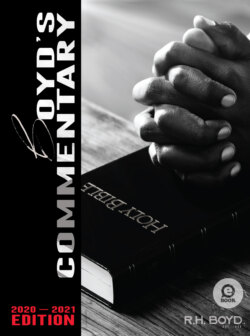Читать книгу Boyd's Commentary - R.H. Boyd Publishing Corporation - Страница 55
На сайте Литреса книга снята с продажи.
II. RESPONDING TO OFFENSE (LUKE 6:29–31)
ОглавлениеContinuing His discourse on loving one’s enemies, Jesus encouraged His followers to answer the hostile actions of offenders with extreme kindness. Jesus said, “If anyone strikes you on the one cheek offer the other also” (Luke 6:29, NRSV). While this directive may seem extreme, not to mention a little naive, there is a deeper meaning to it. When an offender in Jesus’ day struck someone on the face, they would have used only their right hand to do so as it was considered the more dominant of the two. By turning the other cheek and allowing the offender to strike again, they would be forced to reorient themselves accordingly so as to again use their right hand. Going through the trouble of having to change their position may have dissuaded the offender from doing it at all. Therefore, though it is by violent means, turning the other cheek, according to Jesus, was a way to passively promote change in both the action and attitude of the offender. Jesus commanded His followers to act out of love rather than retaliation.
Jesus furthered His discourse by telling His disciples that if someone stole or took away their cloak, they should give them their tunic as well. This implied that if someone was desperate enough to steal a cloak, the outer garment, they may need the tunic, the inner garment worn under the cloak, as well. This is rooted in part in Exodus 22:26–27 (NRSV): “If you take your neighbor’s cloak in pawn, you shall restore it before the sun goes down; for it may be your neighbor’s only clothing to use as cover; in what else shall that person sleep? And if your neighbor cries out to me, I will listen, for I am compassionate.” Obviously the notion of divine compassion and wrath were not new. Jesus however, inverted the command. In the Old Testament reference, the one who borrowed the tunic was to return it. By inverting the command, Jesus convicted the one who had taken the tunic or coat and not returned it. He or she had already violated the law by doing so. By giving up the tunic, one is able to demonstrate both love and righteousness that is unparalleled by the offender.
Jesus’ instruction to give to anyone who asks in Luke 6:30 was a reference to the common practice of lending and borrowing. Instead of lending your possessions to those who are in need and charging interest until its paid off or given back, Jesus implored His disciples to not ask back what was loaned or borrowed—in selfless love, just let them have it. Jesus’ directive on borrowing and lending was a strengthening of Exodus 22:25 (NRSV): “If you lend money to my people, to the poor among you, you shall not deal with them as a creditor; you shall not exact interest from them.” This emphasis was reiterated in Leviticus 25:35–37. These Old Testament references only specified that interest could not be charged to other Israelites. Outsiders could be charged interest. Additionally it was expected to repay that which was borrowed. Jesus strengthened the command in that interest was not allowed to be charged to anyone, whether they belonged to the same grouping or not. Also, He advocated for generosity as opposed to expected repayment. Jesus built on the Word of God and took the invocation of love further than it was previously known.
In verse 31, Jesus reinforced a common ideology that would be known to the more devoted disciples, to do to others what you would want them to do to you. Known as the golden rule, this last command of Jesus in this passage served as a summation of all He had said. It typified the kind of corresponding action to God’s character of mercy and promoted a demonstration of love independent of others’ behavior.
